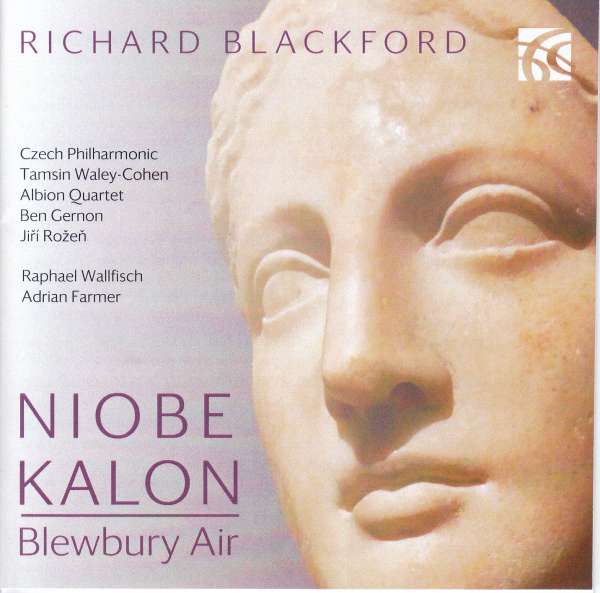Niobe, die Tochter des Tantalos, Mutter von sieben Söhnen und sieben Töchtern nahm sich das Recht heraus, sich über die Titane Leto zu stellen, welche nur zwei Kinder geboren hatte, Apollon und Artemis, und hinderte das Volk an deren Verehrung. Auf Letos Befehl streckten Apollon und Artemis alle 14 Kinder mit Pfeil und Bogen nieder. Niobe erstarrte zum einem Stein, wurde durch einen Wind nach Phrygien auf die Spitze des Berges Sipylos versetzt. Doch auch der Stein hörte nicht auf, Tränen zu vergießen, die in Kaskaden die Felswand hinunterfließen.
Richard Blackford hat das Thema aktualisiert, wie er zu seiner Komposition schrieb: « Ich diskutierte mit Tamsin Waley-Cohen über die Notlage von Frauen in unserer eigenen Zeit, die unter der Scharia und anderen religiösen Gesetzen grausam und hart für Vergehen der Blasphemie, Apostasie und Nonkonformität bestraft werden. Unsere anschließenden Diskussionen beinhalteten die Doppelmoral, die auch auf westliche Frauen angewandt wird, und wie Niobes Geschichte die Notlage von ungerecht behandelten Frauen in einem breiteren Kontext widerspiegelt. »
Das Violinkonzert hat vier Sätze: Niobe die Liebende, Niobe die Lästerin, Niobe die Bittstellerin, Niobe die Trauernde. Der erste Satz ist relativ ruhig und von lieblich-romantischem, zum Teil auch leidenschaftlicherem Charakter, sensibel und suggestiv. Die beiden dramatischen Mittelsätze sind technisch herausfordernd und virtuos sowohl im Solopart als auch im Orchestersatz.
Der langsame Schlusssatz ist bewegend in seiner stillen Trauer und seiner Hoffnungslosigkeit, ehe der Tränenfall das Werk apokalyptisch beendet. Das ganze Konzert wird von Tasmin Waley-Cohen mit intensivem Ausdruck und viel Charisma gespielt. Ihr Klang ist in einen nicht weniger engagierten und prägnanten Orchesterklang eingebettet.
Das erst 2019 komponierte Kammermusikstück Blewbury Air bezeichnet Blackford als Liebesgang für das Dorf Blewbury, Oxfordshire, wo der Komponist lebt. Lebhaftes Leben am See, Glockengeläut und Windspielereien in den Bäumen: das tonmalerische Werk ist reizvoll und wird inspiriert dargeboten von Raphael Wallfisch und Adrian Farmer.
Bei aller technischen Tüftelei im Rahmen des Polytempos und der ausgedehnten Tonalität ist The Challenges of Kalon für Streichquartett und Streichorchester ein sehr ausdrucksstarkes, farbig ungemein reiches Stück, das hier in einer packenden Interpretation zu hören ist.
Und so bietet diese monographische CD einen interessanten Einblick in das Schaffen des 67-jährigen britischen Komponisten Richard Blackford.
Niobe, the daughter of Tantalus, mother of seven sons and seven daughters, took the right to place herself above the titan Leto, who had born only two children, Apollo and Artemis, and prevented the people from worshipping them. At Leto’s command, Apollo and Artemis struck down all 14 children with bow and arrow. Niobe froze to a stone, was moved by a wind to Phrygia to the top of the mountain Sipylos. But even the stone did not stop shedding tears that cascaded down the rock face.
Richard Blackford updated the theme, as he wrote of his composition, « I discussed with Tamsin Waley-Cohen the plight of women in our own time who, under Sharia and other religious laws, are cruelly and harshly punished for offences of blasphemy, apostasy and non-conformity. Our subsequent discussions included the double standards also applied to Western women and how Niobe’s story mirrors the plight of unfairly treated women in a wider context. »
The violin concerto has four movements: Niobe the Lover, Niobe the Blasphemer, Niobe the Pleader, Niobe the Mourner. The first movement is relatively quiet and of a lovely romantic character, sometimes more passionate, yet overall sensitive and suggestive. The two dramatic middle movements are technically challenging and virtuosic in both the solo part and the orchestral writing.
The slow final movement is moving in its quiet sorrow and hopelessness before the fall of tears brings the work to an apocalyptic close. The entire concerto is played with intense expression and charisma by Tasmin Waley-Cohen. Her sound is embedded in an orchestral sound that is no less committed and incisive.
Blackford describes the chamber piece Blewbury Air, composed as recently as 2019, as a love song to the village of Blewbury, Oxfordshire, where the composer lives. Vibrant lakeside life, ringing bells and wind chimes in the trees: the tone-painting work is delightful and inspiredly performed by Raphael Wallfisch and Adrian Farmer.
For all its technical sophistication with polytempo and extended tonality, The Challenges of Kalon for string quartet and string orchestra is a highly expressive, immensely richly colored piece, heard here in a gripping interpretation.
And so this monographic CD offers an interesting insight into the work of the 67-year-old British composer Richard Blackford.


















